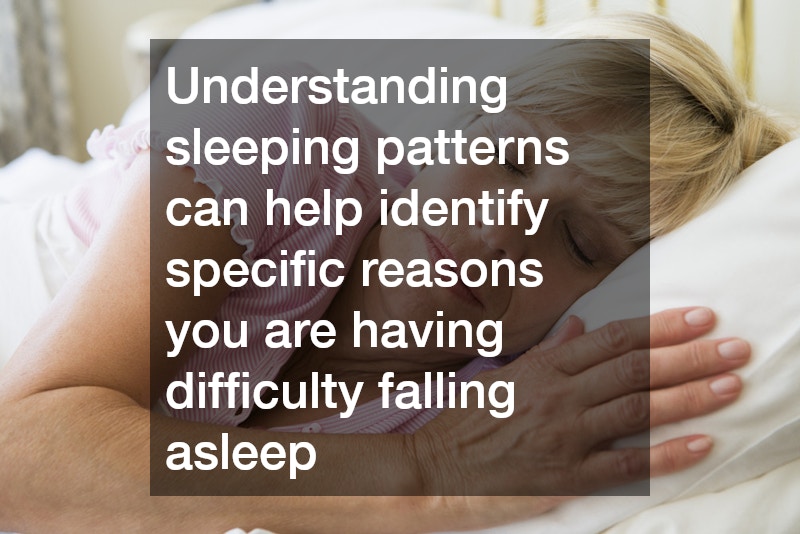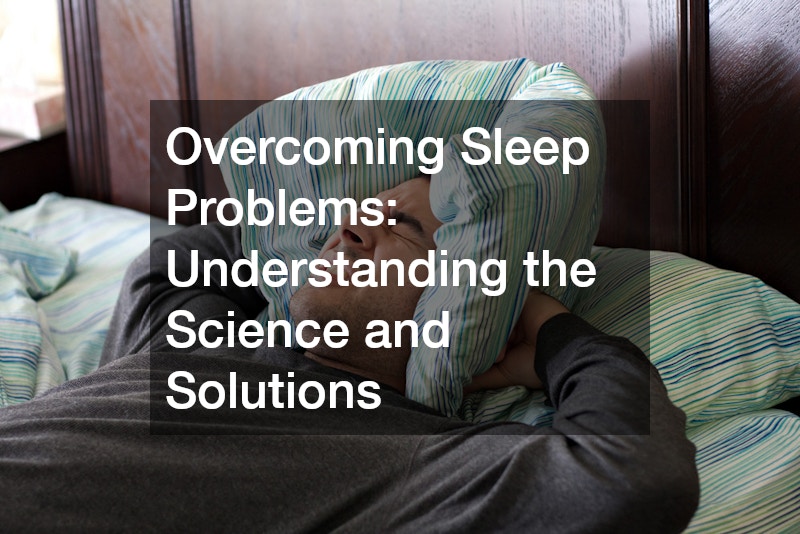Sleeping problems can be a daily battle for many people, and this can significantly impact their well-being. Sleep is an aspect of health that is often overlooked despite the fact that it plays a critical role in cognitive, emotional, and physical functioning. Understanding factors that affect sleep can help individuals find effective solutions to improve their quality of life.
This article will examine the various factors that can contribute to poor sleeping, from medical conditions such as sleep apnea to lifestyle choices and environmental influences. We will explore how local resources such as chiropractic care and other specialized health services can be used to tackle these issues. We want to offer a comprehensive guide to those having difficulty sleeping and outline practical steps to achieve restful nights.
This article is a great resource for those who are experiencing sleep problems. It incorporates specific keywords that relate to sleep health. Every aspect of sleep is important, whether it’s the treatment of widespread conditions such as peripheral artery diseases or the comfort of the sleeping environment. Let’s dive into each section in order to understand the challenges associated with getting good sleep.
Understanding Sleep Cycles and Their Role in Sleep Quality

The sleep architecture is made up of multiple cycles. These are REM (Rapid Eye Movements) and non-REM. Each cycle has a specific purpose and is important for processes like memory consolidation, emotional regulation, and physical recovery. These disruptions can lead to fatigue, which is why many people have trouble sleeping.
Each cycle lasts approximately 90 minutes. A disruption during this cycle can prevent an individual from reaching deep, restorative sleep. Understanding sleeping patterns can help identify specific reasons you are having difficulty falling asleep.
Individuals can improve their sleep quality by following a regular schedule and establishing a relaxing pre-sleep ritual. It can include reading, taking warm showers or doing light stretching. Understanding the body’s rhythms can help you better understand sleep cycles and develop strategies to overcome sleep problems.
The Effects of Sleep Apnea on Overall Health
Sleep apnea, a serious sleeping disorder, is characterized by breathing pauses or shallow breaths while asleep. This condition can reduce sleep quality and cause individuals to feel excessively tired, causing problems with memory and concentration, as well as increasing their risk for chronic diseases such as hypertension and diabetes. Sleep apnea is a serious problem for those who have trouble sleeping.
Individuals seeking local sleep apnea treatment can choose from CPAP devices (Continuous Positive Airway Pressure), lifestyle changes, and specialized therapeutic options. Consultations with sleep medicine specialists can result in tailored interventions to address specific sleep apnea symptoms. Recognizing the relationship between sleep apnea, mental health, and treatment is crucial.
Early detection and treatment are essential due to the severity of sleep apnea if left untreated. You should consult a physician or local sleep clinic if you suspect this disorder is affecting your sleep. Apnea sufferers can find relief with the right management.
Exploring Circulation Issues That Disrupt Sleep
Circulation problems, such as peripheral arterial disease, can affect a person’s sleep quality. Poor circulation can cause discomfort, pain, and restless leg syndrome, which all contribute to a lack of relaxation and sleep. If you are having difficulty sleeping, it is important to identify circulation issues. This will help determine the best treatment.
Consider improving circulation by changing your lifestyle. Regular physical activity and maintaining a healthy diet can improve blood circulation. If you are facing serious challenges, it is worth consulting specialists or considering therapies available at local wellness centers.
Professional intervention, like consulting a chiropractor in some cases, can help relieve discomfort caused by muscular or skeletal problems that may affect circulation. Chiropractic adjustments may provide pain relief, which can lead to better sleep. Understanding how circulation affects sleep will ultimately lead to more effective solutions for those who struggle to sleep.
How Chiropractic Care Contributes to Better Sleep
Chiropractic care can be a great solution to sleep problems. It is often overlooked, but it has the potential to address underlying conditions that interfere with restfulness. Misalignments of the spine can cause discomfort, pain and tension. This makes it difficult to get a good night’s rest. A chiropractor can help those who are having difficulty sleeping.
Chiropractors use a variety of techniques to align your spine and improve the overall function of your body, which can reduce discomfort and increase relaxation. Regular chiropractic adjustments also improve posture and nerve function. Both of these factors contribute to better sleep quality. Individuals may experience significant improvements in their sleep quality by addressing the core issues that cause discomfort.
Chiropractic care can include advice on sleep posture, lifestyle changes, and other recommendations to promote long-term sleep. For those with difficulty sleeping, a holistic approach that includes chiropractic care and tailored therapy strategies can be especially beneficial. Focusing on physical and mental health can help individuals develop a strategy to achieve meaningful sleep.
Creating a Relaxing Environment for Enhanced Sleep Quality
The environment in which sleep takes place is crucial to sleep quality. A calm atmosphere can be the difference between restless sleep and a good night’s rest. A relaxing bedroom can help those who have trouble sleeping.
Reduce noise, lower temperature, and improve lighting to enhance your sleep. Blackout curtains and sound machines are great ways to minimize distractions, which can prevent you from falling asleep. A comfortable mattress and pillow tailored to your personal preferences can also be beneficial.
Decluttering the bedroom will also help to reduce stress and distractions. Relaxation is encouraged by a calm and tidy environment. Sleep health can be improved by making simple changes for those who struggle to sleep.
The Importance of Air Quality in Promoting Better Rest
The quality of the air in your sleeping environment is crucial to a restful night’s sleep. Poor air quality is linked to a variety of health problems, such as allergies, breathing difficulties, and sleep disorders. If you have trouble sleeping, the air quality is a factor that should be addressed.
Investing in an air purifier can help improve air quality by reducing allergens, airborne pollutants, and other contaminants in your home. By regularly maintaining ventilation systems and by using duct cleaning products, you can ensure the air in your home is as clean as it can be. Keep windows open during good weather to allow fresh air and promote a relaxing atmosphere.
It is important to be aware of the indoor air pollutants such as mold, dust and chemical residues. Preventative measures such as regular cleaning and maintenance can make a significant difference in creating a healthier sleep environment. Prioritizing air-quality can help those who struggle with sleep.
Recognizing the Impact of Mold and Mildew on Your Sleep Space
Mold and mildew create an unfriendly environment for sleeping, causing respiratory problems and allergies, which can worsen sleep issues. These conditions have been linked to a number of health issues, including poor-quality sleep. Eliminating mold and mildew is a good way to create a sleeping environment that will help people sleep.
It is important to inspect your home regularly and identify any areas that may be susceptible to mold growth, especially in moist places like basements and bathrooms. For large infestations, it may be necessary to hire professional mold and mildew removers. Mold can be prevented by regulating humidity levels and providing proper ventilation in the home.
Mold and mildew can be removed to improve the health of your sleeping area. Clean and healthy surroundings are conducive to relaxation, which in turn is necessary for good sleep. Mold and mildew can be removed to reclaim your sleeping area and improve your chances of a restful sleep.
How Foot and Ankle Discomfort Affects Sleep Patterns
Sleep quality can be affected by foot and ankle pain. These painful conditions can cause you to toss and turn, which prevents restful sleep. Understanding how foot and ankle pain might contribute to sleep problems is important for people who have trouble sleeping.
Consult a foot and ankle specialist to diagnose and treat conditions like plantar fasciitis and tendonitis. If you address the source of your problem, you may find significant relief from the pain and discomfort which would otherwise disturb sleep. Physical therapy and orthotic devices can be used to provide better support when sleeping.
A proper bedtime routine, which includes foot care such as soaking, stretching, and squeezing, can have a positive effect on sleep. Healthy habits can help you sleep better in the future. Foot and ankle health is a key factor in overcoming sleep issues and achieving restful slumber.
The Relationship Between Lifestyle Choices and Sleep Challenges
Sleep patterns and quality are influenced by lifestyle choices. Diet, exercise, and the use of technology in the evenings can all affect sleep quality. If you are having difficulty sleeping, review your daily habits and see if there is anything that can be improved.
An excessive intake of caffeine or sugar, especially in the hours before bedtime, may be harmful. By establishing a regular routine of exercise, such as by adding a pool and avoiding strenuous activity near bedtime, you can improve your physical health but also your sleep quality. Limiting screen time prior to bedtime can also help reduce disruptions in the sleep-wake cycle. Contacting a deck or pool contractor can equip your home with the tools to live a healthier life.
Small adjustments can have a positive impact on the sleep experience. It’s important to get support for those who are using substances or feeling stressed from things like attending a dental appointment or a treatment center. Prioritizing healthy habits can help individuals overcome sleep problems.
Seeking Professional Help for Persistent Sleep Problems
Anxiety can be a factor in sleep problems. By preparing for these appointments, you can reduce stress and improve mental clarity before the visit. This can help facilitate a restful night’s sleep. Take steps to improve your comfort level before an appointment with a healthcare provider.
Create a list with questions and concerns about sleep to guide your conversations with doctors or specialists. This will ensure that you get the most relevant information regarding your health. Establishing routines before appointments, such as relaxation or mindfulness techniques, will also help to calm nerves. Self-care can help you have more productive meetings and reduce sleep disturbances.
By preparing in advance, people can reduce their anxiety and increase their confidence. This proactive approach will lead to improved sleep quality which is essential for overall health. A better management of sleep issues will lead to a restful sleep.
Creating a Soothing Evening Routine for Better Sleep

It is important to establish a relaxing evening routine in order to prepare the body for sleeping. This routine will signal your brain to relax, improving sleep quality. A structured evening routine is the best way to overcome sleep problems.
Reading, gentle stretching, or yoga can help create a calming atmosphere that is conducive to sleeping. Reduce your exposure to bright light, especially blue light from screens. This can interfere with the production of melatonin, which is necessary for sleeping. Incorporating deep breathing exercises and meditation in the evening will help to relax the mind and prepare it for a restful sleep.
Consistency is key to establishing healthy sleeping habits. Predictability helps people relax and let go of daily stressors. This leads to a better sleep experience. The routine will help those who have trouble sleeping to get a deeper and more restorative night’s sleep.
Recognizing the Impact of Hydration on Sleep Quality
The importance of hydration in sleep is well-known. Dehydration may cause headaches and general malaise. This can make it difficult to fall asleep. Reviewing daily hydration can reveal potential sleep problems for individuals who are having difficulty sleeping.
Even though it is important to stay hydrated throughout the day to avoid dehydration, fluid intake should be monitored in the hours before bedtime. Drinking large amounts of fluids before bedtime can cause frequent bathroom trips during the night. This can disturb deeper sleep cycles. It is important to find the right balance of hydration, so that your body can be adequately hydrated without disrupting sleep.
Local spa water delivery can be a convenient way to get high-quality water and encourage better hydration. This convenience can encourage a more disciplined approach towards fluid intake throughout the day. Improved hydration will ultimately contribute to better health and, in turn, improve sleep quality.
Exploring Local Resources for Enhanced Sleep Health
If you are having difficulty achieving restorative, healthy sleep, it is important to explore local resources. In many communities, you can find a wide range of services, including sleep medicine clinics, chiropractic care, and wellness centers. These local resources are a great way to find tailored solutions for those who have trouble sleeping.
Local sleep apnea treatment, for instance, can result in a more customized approach to managing sleeping disorders. This ensures that people receive help that is directly aligned to their needs. Wellness centers also host support groups and workshops, which provide valuable information and connections to the community. By utilizing these resources, individuals can take charge of their sleep health.
By networking with professionals in the community, you can gain a better understanding of sleep and develop a variety of techniques that will improve your quality. By using available resources, people can create an environment that promotes better sleep over the long term. By addressing sleep health holistically, individuals can find sleep solutions that are tailored to their specific needs.
As a result, having difficulty sleeping is a complex problem that affects many aspects of your health and well-being. Understanding the factors that are involved, from sleep cycles to health conditions such as sleep apnea to lifestyle factors and environmental factors, can help individuals develop effective strategies for combating sleep disturbances. Improving sleep health will be achieved by focusing on local resources, hydration, and creating a relaxing atmosphere.
In our quest for a better night’s sleep, holistic approaches to wellness, such as chiropractic care and routine adjustments, can be of great benefit. Restful nights can be achieved by adopting a proactive attitude that promotes self-care and health. We can all work together to combat the issue of insufficient sleep and find the joys of peaceful slumber.
Prioritizing sleep and addressing its challenges can help individuals reclaim their evenings and improve their quality of life. It may take some effort to achieve better sleep, but it is worth the reward of a restful night.



Leave a Reply